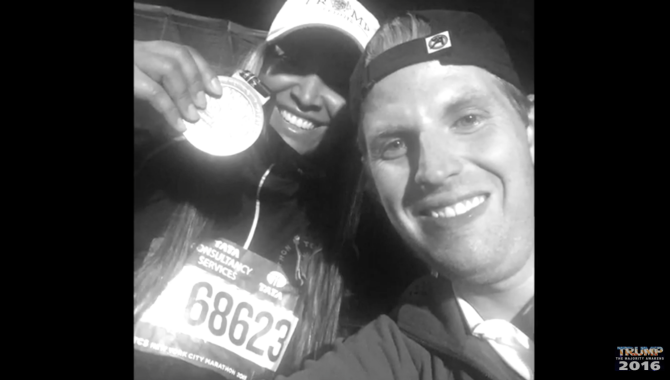[ad_1]

Lynne Patton and Eric Trump
Lynne Patton screenshot
The house Negro always looked out for his master … lived right up next to his master … ate the same food his master ate and wore his same clothes. And he could talk just like his master—good diction. And he loved his master more than his master loved himself. That’s why he didn’t want his master hurt.
If the master got sick, he’d say, ‘What’s the matter, boss, we sick?’ When the master’s house caught afire, he’d try and put the fire out. He didn’t want his master’s house burned. He never wanted his master’s property threatened. And he was more defensive of it than the master was.” – Malcolm X, 1963
Lynne Patton, the director of the Eric Trump Foundation and assistant to Eric Trump, Ivanka Trump and Donald Trump Jr., is a black woman who loves her “boss” and her “family” and she wants all the Negroes in battlefields across the country to ignore Donald Trump’s virulent brand of racism and help her protect and elevate his house.
In a five-minute video plea, Patton, choking back tears, assures us that she is a “highly intelligent, free-thinking and independent woman” that does not “vote based on the color of [her] skin or the signature on [her] paycheck.”
So, then, why would she do this? Why would she position herself as one of Trump’s negotiating chips thrown on the table as he attempts to close the biggest, corrupt deal of his career?
Said Patton: “I can no longer remain silent about the repeated and reprehensible attempts to align my boss and his family with racist, hate-mongering groups, campaigns and messaging.”
Let’s be clear: From funding a witch hunt of the Central Park Five to racist, housing discrimination and support of private prisons, Donald Trump’s relationship with “the blacks” amounts to nothing more than the number of African Americans willing to foreclose on their dignity for a seat at his table—or in his jet. And Patton’s pathetic attempt at revisionism is nothing more than a transparent attempt to curry favor with her “family” and her “boss.” It does not matter how many black babies Trump kisses, his record speaks as loudly as the incendiary words he wields to whip his base into a frenzy.
He has actively embraced the most base, violent, ignorant and racist corners of the citizenry. He has done this by calling Mexican immigrants “rapists and criminals.” He has done this by refusing to disavow the Ku Klux Klan—a domestic terrorist organization that would have lynched Patton’s father from a tree in his hometown of Birmingham, Ala., if given half the chance—before ultimately caving to political pressure.
Birmingham, the city where Trump said a black protester deserved to be “roughed up.”
And when he’s not busy talking about small hands and big penises on the campaign trial like a pubescent boy, he keeps himself amused by spewing misogynist rhetoric for the titillation of a fanbase that doesn’t care that he fantasizes about his daughter’s body and the possibility of dating this woman that he “helped create.”
“What’s the matter, boss, we sick?”
Patton also insisted that the comparisons being made between Trump and Hitler trivialize the Holocaust, when this is a man who said that Muslims, all Muslims, with the exception of the ones he approves, should not be allowed to enter the United States and that those who live here should carry special identification cards.
He has fanned the flames of resentment and loathing in this country, believing that he is the one who will rise to the top when the “melting pot” bubbles over and burns us all.
Trump is a demagogue spreading pestilence throughout the country, inciting violence against black women and Latinos, black men and Muslims, while his black female protectors, Patton and Katrina Pierson, take pride in being the special snowflakes swirling in a political storm, untethered from any sense of reality, proud to be his “black friends.”
There is nothing “free-thinking” about being a pawn. There should be no pride taken in being at the forefront of a “movement” steeped in fear, racism and violence, packaged for the lowest, common denominators and sold to the highest bidders. There is no glory in the shadows of power and privilege; just a level of comfort and complicity that clearly makes it easier for Patton to sell out and buy into the myth that proximity to whiteness somehow makes her different; that it, somehow, makes her safe.
To paraphrase what a wise woman once told me, “You can lie to us, Patton, just please don’t lie to yourself.”
[ad_2]




















